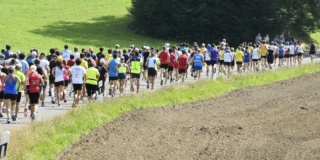
Interview with Florian Vieux
After 2013 and 2016 the 32 year old native of Valais has for the third time won the Biel Running Days, the Swiss 100 km championship. Vieux won the race with consummate ease, races in legs of several days being his strong point. By a narrow margin his finishing time of 7:01:13 hours failed to achieve his target of finishing in less than 7 hours.
What was your experience of "your" day or night? Can you give us an insight into how you ran the race and your feelings?
During the days prior to the race I became more and more nervous, although I did not put myself under any pressure. But because it was the big day I prepared myself, I thought about a thousand things. For example, I wondered what the race could offer me and if I was fresh enough for the 100 km. It was not until I arrived in Bienne, that my nerves calmed down. I enjoyed the time spent with my family and friends before the race started at 10.00 pm.
The race was very special because two runners set off like madmen. I quickly found myself between them and the peloton and I finally ran 98 of the 100 kilometres on my own. Fortunately, the rules allow you to be followed by a cyclist, which makes things a lot easier.
For the first 40 kilometres I felt fine. But between 45 and 55 kilometres I hit a huge crisis. I viewed everything negatively and found it very difficult to escape from this negative spiral. What helped me was the company of the cyclist, positive music and the fact that I was out in front. That and the many familiar faces at the side of the road made me totally euphoric.
You ran the 100 kilometres during the "night of nights" with an average of 4:13 min/km. Can you give us an idea of your training programme? What is your training philosophy?
I train five to six times a week for 9 to 20 hours. Three endurance units - generally a block of three with a unit in a different sport (cycling or ski mountaineering) - equate to one average unit with Marathon Pace and one very intensive unit - often on the track. Then there is a strength unit.
Generally I take advantage of my past as a high-level wrestler, both on the mental level and on the basic physical level. The sport of wrestling makes you harder and sturdier. I train the young wrestlers in my region and I greatly enjoy continuing to wrestle.
What in your opinion are the basic keys to success?
The joy of running is central; without that it becomes difficult. Then you have to be capable of being hard with yourself when necessary. To train intensively you have to know how to go beyond your limits and thus accustom your body to surpassing itself. If you train hard, the race becomes simpler.
Many runners toy with the idea of taking part in an ultra race once in their life. What advice would you give them on the most important factors for making this project a success?
Anyone who tackles such a project must be prepared to give 100% of themselves to achieve these objectives. "Just" running is not enough. You also have to train for strength, agility and speed.
Next, it is recommended that the amount of training is increased gradually, so that pleasure and passion can develop and be maintained.
And of course, you must train, train a lot. In any case, quality should take priority over quantity.
Is there a piece of secret advice you can give us? Advice on training, nutrition or recovery, for example?
-
Do not be afraid of high intensities and the red zone. This is the only way to stimulate your body and to guide it into adapting to a high level.
-
Do not experiment with new drinks or new gels during the race.
-
Do not subject your body to too many competitions. Give it a rest after intensive phases, so that it will once more be ready to train hard.
Foto: ZVG
Many thanks to Florian Vieux for the interesting answers and tips.
This may be of interest for you too


